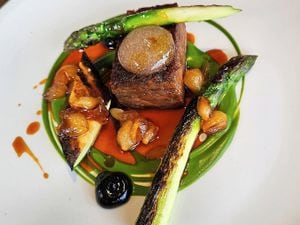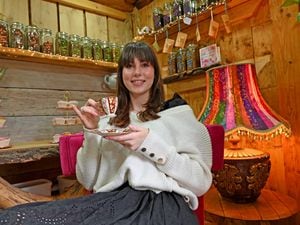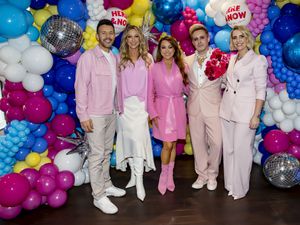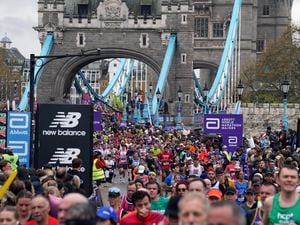Meera Syal talks about appearing in Birmingham Hippodrome's pantomime
It took Meera Syal seconds to decide whether or not to do this year’s MEGA pantomime at Birmingham Hippodrome.
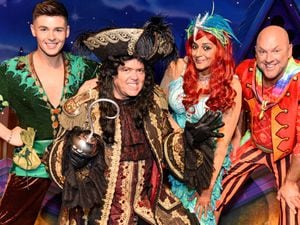
The words: ‘Yes, I’m in . . .’ were spluttering out of her mouth almost before her agent had finished asking her.
After, all, what’s not to like.
It’s on home turf, she gets to play to the biggest audiences in the country and her own kids will get to see their mum in the country’s best festive show.
“I’m thrilled,” says Meera. “I’ve been asked to do panto before but it was never the right time or the kids were too little and so on.
“I’ve worked with the producer, Michael Harrison, before on Annie in the West End and he was lovely to work for, as was his team. So it was an easy decision, really. It’s my home town . . . And I’m going to share the stage with an Osmond.”
Ah yes. Dastardly Jimmy will play Captain Hook while there also be performances from the brilliant Matt Slack, pop star Jaymi Hensley and BGT’s Sascha Williams. The shows will come thick and fast as Meera transports audiences to Neverland for matinees and evening shows. And, remarkably, it’ll not only be her first appearance at the Hippodrome – it’ll be the first time she’s ever been to the end-of-year panto.
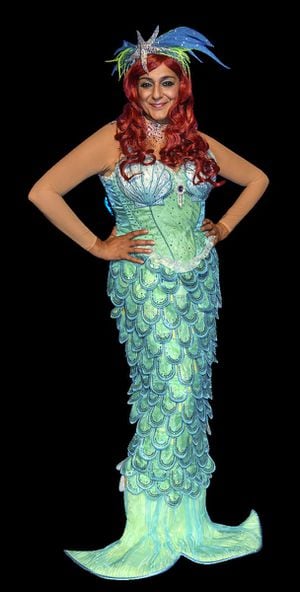
“I’ve never been to the Hippodrome before but I take the kids to it. We go in London because family and friends are there. But everyone I’ve talked about the Hippodrome show has said it’s not only brilliant but Matt Slack is a force of nature. They are hugely more experienced than I am in the world of panto. For me it’s a very gentle introduction. I’m in my home town. I’m hoping they will hold my hand.”
Meera’s done plenty of theatre before and has grown used to the gruelling eight-shows-per-week grind that is being in a big show. She’s never, however, even attempted the 12-shows-per-week run that she’ll face when the curtain goes up between December 19 and January 27.
“I think I’ll just have to look after myself because it’s 12 shows a week. There’ll be no carousing and no going out for a 3am in the morning curry – though if I did that, I’d never get into my fishtail. It’s a tough schedule. But what I’m really looking forward to is that I can’t think of any other time where it’s just your job to give people joy. People pay a lot to come to the panto for their annual treat and our job is to make it as fun as possible. It’s wonderful really, isn’t it.”
She’s looking forward to engaging with the audience too, with plenty of slapstick and ‘he’s behind you’ moments.
“That fourth wall comes down. People feel they own their pantos. It’s rooted in their community and every local theatre does it. There’s a real sense of investment. I love all the engaging with an audience. Most of the work I did when I started out was theatre in education. I did Shirley Valentine for six months, for instance, which was just me and the audience – it was magical. Kids are a great audience too. If they don’t like you, they know it. You get a lot back though if they do. Pantomime is just such a British thing. It’s a great tradition. There’s no fourth wall. It’s about doing it together. And I love being in the West Midlands. It will really help that I’ll be familiar with the people and they’ll be familiar with my accent, rather than the usual joke of ‘Oh, am yow from burmingem….’ We all know we don’t all talk like that.”
Meera’s roots extend back to Essington, the small mining town a few miles to the north of Wolverhampton. That was where her Punjab-born parents raised her, after moving to the UK from New Delhi. Her family moved to Bloxwich when she was young though her experiences in Essington formed the basis for Anita and Me, her best-selling book. The semi-autobiographical story focused on her family’s experience as the only Asia family in Essington, where racism was rife but there were diamonds in the rough who moved to protect her too.
Anita and Me won the Betty Trask Award for Meera’s first book while she subsequently won the Media Personality of the Year award at the Commission for Racial Equality’s annual Race in the Media awards in 2000 before securing the the Nazia Hassan Foundation award in 2003.
In part, those awards were because she chronicled the experience of first generation British Asians, who had been largely anonymous or, worse, ignored, prior to her book. Meera was thrilled when a version of Anita and Me was staged more recently, including an exceptional run of shows at Wolverhampton Grand.
“I was so thrilled with what the whole company did that with that. It was really emotional seeing it in Birmingham on the stage there. There were people in the audience I was at school with who turned-up, which was incredible.
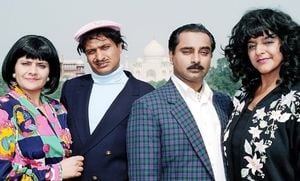
“When I wrote the book all those years ago I never would have imagined it would sell so well or end up on the school curriculum. I was just writing about a childhood I didn’t want to forget. But it doesn’t just speak to British Asians. It speaks to everyone. That rural working class way of life has largely disappeared and I wanted to write it all down.”
The reaction to Anita and Me from audience members and critics alike thrilled Meera. It gave her a sense of validation. “That’s what we all want to hear as an actor or a writer. Of course we want to know that a story or performance moved or touched someone, that it made them think this or that. That’s what creatives really look for. When you move people, that’s when when you know you’ve done your job.”
Meera has forged a remarkable career. After leaving the Black Country, she studied English and drama at Manchester University, graduating with a double first. She took a one-woman play to the National Student Drama Festival, where it won a prize to perform at the Edinburgh International Festival, where it also won a prize. As a result, a director from the Royal Court Theatre contacted Syal and asked her to perform in a play at the Royal Court on a three year contract.
Meera wrote Bhaji on the Beach, working with Gurinder Chadha, of Bend it Like Beckham fame. Goodness Gracious Me followed for the BBC between 1996 and 2001 as well as a role as scriptwriter on A R Rahman’s Bombay Dreams, with Andrew Lloyd Webber. The internationally-acclaimed, Emmy-winning BBC series The Kumars at No 42 followed while she’s subsequently starred in the BBC 2 sitcom Beautiful People, played Shirley Valentine and featured in two episodes of Doctor Who alongside Matt Smith.
The awards have followed too. She was appointed visiting professor of contemporary theatre at St Catherine’s College, Oxford. She has an honorary degree from SOAS, University of London and from University of Roehampton. She received her CBE from the Prince of Wales on 6 May 2015 at Buckingham Palace and in 2017, Meera was elected a Fellow of the Royal Society of Literature.
Meera enjoys being creative across different formats, from TV to film, from radio to literature. “That’s out of necessity. When you start out, you think how can I create work? In my case, I just had to create those roles in order to play them. I think it’s great to have that writing string to my bow. It‘s interesting that so many more actors are doing that now. People like Emma Thompson have always done it. If people want longevity and control over their career they have to create the opportunities.”
She was proud of the way Goodness Gracious Me and The Kumars struck a chord with millions of people. “It was a story told through a cultural comedy lens. Comedy really reaches people in such a universal way. I enjoy having that kind of connection.”
And yet she’s still a little surprised that she’s been so busy for so many years and produced work of such a consistently high standard. Though she knows she has the ability, it’s one thing to think it and quite another to do it.
“I’ve been totally surprised at the way things turn out because you just never know how people will react. I’ve done stuff and people have said it will be a sure fire hit and it’s disappeared without trace.
“With Goodness Gracious Me and The Kumars, we were just doing what we found truthful and funny and people picked up on it. It was very fresh and original and unique. We were first born kids born and brought up in Britain and with a unique take on the world. We took the mickey out of everybody and that was important. But we could never have predicted that they’d be hits.”
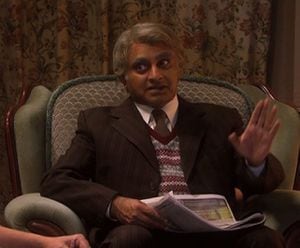
Meera’s career has been typified by variety – it has, quite literally, been a case of from Pinter to panto.
And yet arguably her greatest achievement has been to bring the experience of British Asians into the mainstream, to smash the racist stereotypes, to give a whole community a voice of its own and to illustrate the shared humanity that everyone has, irrespective of race or colour, gender or creed. Like her fellow Black Country comic Sir Lenny Henry, she’s been at the forefront for BAME groups and has made a profound difference through her work.
“It was important when I wrote Anita and Me to to record the things that we were going through. I thought we’re not in the history books, as first generation British Asians, but we were a part of British society and our stories were also part of the fabric. We were contributing and we had a sense of humour. We had things in common with families who’d lived her for centuries but we also had things that made us different.
“I always thought you had to be out there otherwise you end up feeling you’re invisible and you don’t matter. I missed seeing myself reflected when I was growing up. I wasn’t seeing British Asian role models presenting news or writing or being on TV. So that made me somehow not important and gave people a licence to make jokes about it. It didn’t feel right. So I wanted to go ‘we’re here and we’ve got amazing stories to share with you’. I wanted to amuse and surprise people with our history. The biggest thrill I get is that Anita and Me got onto the school curriculum. I opened a school study guide and there were pages about the rising of the National Front and Enoch Powell’s Rivers of Blood speech. I thought OMG when I saw that. I realised that children were learning about British history because of me. It was incredible.”
And, arguably, it’s even more important now.
Meera agrees. “We need it at the moment. We’re in dark times with divisions and intolerance and fear of strangers is tearing us apart. We all love, cry, bleed and have families and want to do better.”
She was proud to accept a raft of honours, not least her OBE in 1997 and her CBE in 2015.
“It’s an extraordinary moment to know the work you have done has had impact. I accepted those awards on behalf of my parents who grew up under the British Empire. Their lives were influenced and torn apart in some way by the Empire. To have a bit back in the shape of a medal – my dad was in a refugee camp after partition, you know – so to stand with him and get a medal of the Empire was mind blowing and a real journey. It was a tribute not only to their hard work but to the country that I found myself in that allowed me to flourish and blossom. Mind you, I don’t think the telephone’s ever been so hot. Every vaguely Indian person I’ve ever known knew about it.”
The trailblazing Meera deserved such recognition. From humble beginnings on the outskirts of Wolverhampton, she has become one of Britain’s most important, most influential and funniest performers.
And it’s the funny stuff that will be at the forefront when she makes a welcome return to the West Midlands for Peter Pan.
Peter Pan runs at the Birmingham Hippodrome until January 27. To buy tickets visit www.birminghamhippodrome.com

